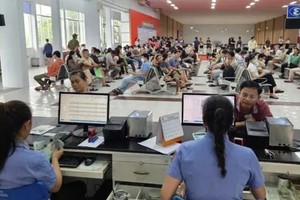On December 19 Electricity Vietnam Group (EVN) announced a hike of 5 percent on electricity prices, a decision being met with a conflicting public opinion, those that agree and those that don’t.
National Assembly deputy Cao Si Kiem spoke with a Sai Gon Giai Phong reporter saying that at the moment when
However, this hike may cause a domino effect with other essential commodities also surging, further deepening the current inflation and causing hardship for poorer workers.
However, Cao Si Kiem argued that the increase in electricity prices is unavoidable as with this price increase, EVN will earn an additional VND6 trillion ($285.5 million) per year, which is “a very modest figure”. Earlier EVN had recommended an 11 percent rise.
Debts of Electricity Vietnam Group exceed VND240 trillion ($11.4 billion) as of 2010, according to a recent report from the State Audit of Vietnam.
But Cao Si Kiem believes that the general public now attributes the price hike to poor management and high salaries of leaders in EVN.
Recent audit results show that the Vietnamese state-run electricity has invested over VND2.1 trillion in sensitive and non-core sectors such as properties, insurance and banking, accounting for 3.27 percent of the group’s equity.
As a result, EVN investments have become inefficient since the aforementioned sectors are presently facing certain difficulties.
Also, EVN saw huge losses after pouring money in telecommunications with an investment of VND2.442 trillion into its subsidiary, EVN Telecom.
According to the State Audit of Vietnam, the total debt of EVN by late 2010 was VND200 trillion, making up 80 percent of EVN’s total capital.
The sum of money EVN owes to two other state-owned groups, PetroVietnam and Vinacomin, until June 30 this year, is estimated at more than VND8.860 trillion and VND1.2 trillion respectively.
Public opinion showed no sympathy towards EVN. Phuoc Thanh, an SGGP reader expressed anger at high salary payments in EVN.
“The average income of EVN employees in 2010 was VND13.7 million per month. Specifically, monthly incomes of officials in the group are 2 times higher than that, according to the State Audit”, said Thanh.
The monthly incomes of employees in the electricity transmission and distribution segments are VND13.7 million while the normal in an average state-run business is around VND3.5 million.
The salary distribution among EVN affiliates does not ensure equal benefits for all sides, said Thanh.
Another reader, Dang Trung Thanh also expressed his deep concern over the hike in electricity prices, saying that EVN was forcing consumers to bear the burden of the loss, while EVN staffs continue to receive high salaries. “That is unacceptable,” said Dang Trung Thanh.
According to data from the Ministry of Labor, Invalids and Social Affairs, the average monthly salary of employees in 2009 in state-owned enterprises was VND3.35 million and for special corporations and parent companies of state economic groups, the average was VND5.9 million.
























